拓展模块翻译精编版
【精品】sympowersysterms部分模块翻译(可编辑
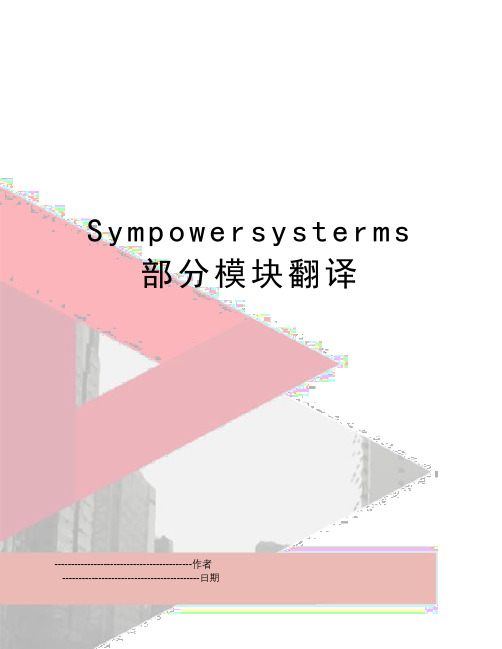
S y m p o w e r s y s t e r m s 部分模块翻译------------------------------------------作者------------------------------------------日期BreakerImplement circuit breaker opening at current zero crossing实现电路断路器在电流过零时断开LibraryElementsDescriptionThe Breaker block implements a circuit breaker where the opening and closing times can be controlled either from an external Simulink signal (external control mode), or from an internal control timer (internal control mode).断路器模块实现了开闭时间由外部Simulink信号(外部控制模式)或内部控制定时器(内部控制模式)可控的电路断路器。
A series Rs-Cs snubber circuit is included in the model. It can be connected to the circuit breaker. If the Breaker block happens to be in series with an inductive circuit, an open circuit or a current source, you must use a snubber.一系列Rs-Cs缓冲电路包含在模型中。
它可以连接到断路器。
如果发生断路器模块串联一个电感电路、一个开路或一个电流源,你必须使用一个缓冲电路。
(完整版)拓展模块翻译
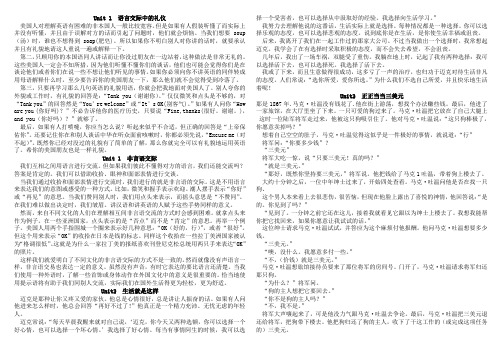
Unit 1 语言交际中的礼仪美国人对理解英语有困难的非本国人一般比较宽容。
但是如果有人假装听懂了而实际上并没有听懂,并且由于误解对方的话而引起了问题时,他们就会烦恼。
当我们想要soup (汤)时,谁也不想得到soap(肥皂)。
所以如果你不明白别人对你讲的话时,就要承认并且有礼貌地请这人重说一遍或解释一下。
第二,只顾用你的本国语同人讲话而让你没过朋友在一边站着,这种做法是非常无礼的。
这些美国人一定会不知所措,因为他们听懂不懂你们的谈话,他们也可能会觉得你们是在谈论他们或者你们在说一些不想让他们听见的事情。
如果你必须向你不讲英语的同伴转成用母语解释什么时,至少要告诉你的美国朋友一下,那么他们就不会觉得受到冷落了。
第三,只要再学习那么几句英语的礼貌用语,你就会把我地面对美国人了。
别人夸你的外貌或工作时,有礼貌的回答是:“Tank you(谢谢你)。
”仅仅微笑和点头是不够的,对“Tank you”的回答然是“You’re welcome”或“It’s OK(别客气)。
”如果有人问你“How are you (你好吗)?”不必告诉他你的医疗历史,只要说“Fine,thanks(很好。
谢谢。
),and you(你好吗)?”就够了。
最后,如果有人打喷嚏,你应当怎么说?听起来似乎不合适,但正确的回答是“上帝保佑你”。
还要记住你在和别人谈话中华在听众面前咳嗽时,你都必须先说,“Excuse me(对不起)”。
既然你已经对没过的礼貌有了简单的了解,那么你就完全可以有礼貌地运用英语了。
希你的美国朋友也是一样礼貌。
Unit 1 非言语交际我们互相之间用语言进行交流。
但如果我们彼此不懂得对方的语言,我们还能交流吗?答案是肯定的。
我们可以借助收拾、眼神和面部表情进行交谈。
当我们通过收拾和面部表情进行交流时,我们进行的就是非言语的交际。
这是不用语言来表达我们的意图或感受的一种方式。
比如,微笑和握手表示欢迎。
潮人摆手表示“你好”或“再见”的意思。
2016中职英语拓展模块(高教版)授课教案:Unit1SocialCommunication
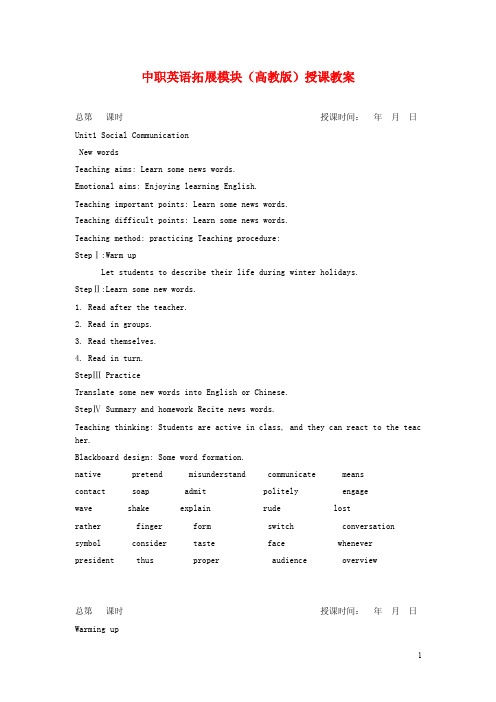
中职英语拓展模块(高教版)授课教案总第课时授课时间:年月日Unit1 Social CommunicationNew wordsTeaching aims: Learn some news words.Emotional aims: Enjoying learning English.Teaching important points: Learn some news words.Teaching difficult points: Learn some news words.Teaching method: practicing Teaching procedure:StepⅠ:Warm upLet students to describe their life during winter holidays.StepⅡ:Learn some new words.1. Read after the teacher.2. Read in groups.3. Read themselves.4. Read in turn.StepⅢ PracticeTranslate some new words into English or Chinese.StepⅣ Summary and homework Recite news words.Teaching thinking: Students are active in class, and they can react to the teac her.Blackboard design: Some word formation.native pretend misunderstand communicate meanscontact soap admit politely engagewave shake explain rude lostrather finger form switch conversation symbol consider taste face whenever president thus proper audience overview总第课时授课时间:年月日Warming upTeaching aims: Learn some news words.Emotional aims: Learn some manners in language communication.Teaching important points: Discuss some questions.Teaching difficult points: Learn some news words.Teaching method: practicing and discussing.Teaching procedure: StepⅠRevisionReview some words.StepⅡ Discussion 讨论课文插图Now look at the picture in the reading text "Etiquette in Language Communic ation".What can you see in it?-From the picture, we can see a woman is talking with a man. But the manlooks a bit uneasy, maybe he is nervous. Obviously it's not a smooth language c ommunication.StepⅢ提示相关生词和短语,如:native speaker, native language, have trouble in doing sth, pretend to do sth, repeat, explain, manner等。
牛津高中英语模块课文翻译精编版

牛津高中英语模块课文翻译精编版MQS system office room 【MQS16H-TTMS2A-MQSS8Q8-MQSH16898】牛津高中英语模块1课文翻译M1U1ReadingSchoollifeintheUK在英国的学校生活GoingtoaBritishhighschoolforoneyearwasaveryenjoyableandexcitingexperienceforme.在英国上了一年的中学对我来说是一段非常令人愉快和兴奋的经历。
我很喜欢英国中学的作息时间,因为学校每天上午大约9点上课,下午大约3点半放学。
ThismeansIcouldgetupanhourlaterthanusual,.这意味着我每天可以比以往晚一个小时起床,因为在中国学校每天上午8点之前就开始上课了。
Onthefirstday,allofthenewstudentsattendedanassemblyintheschoolhall.开学第一天,所有的新生都去学校礼堂参加晨会。
.我当时坐在一个名叫黛安娜的女孩身边。
我们很快就成了最好的朋友。
Duringtheassembly,theheadmastertoldusabouttherulesoftheschool.在晨会上,校长向我们宣布了校规。
.他还告诉我们,赢得尊重的最佳途径就是专心学习并取得好成绩。
这听起来倒是像我在国内就读的学校。
,myclassteacher,wasveryhelpful.过去的一年里我有过许多老师。
海伍德先生,我的班主任,对我的帮助很大。
MyfavouriteteacherwasMissBurke–IlovedthelessonsthatshegaveinEnglishLiterature.我最喜欢的老师是伯克小姐——我喜爱她教的英国文学课程。
.我们班上一共有28个学生。
英国中学的班级差不多就是这么大。
Wehadtomovetodifferentclassroomsfordifferentclasses.我们上不同的课得去不同的教室。
中职英语拓展模块-unit-3-练习册答案教学内容
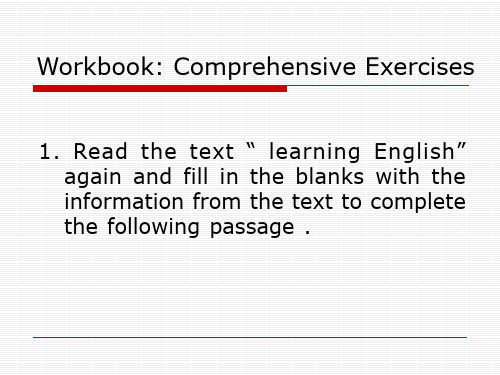
Workbook: Comprehensive Exercises
1. Read the text “ learning English”
again and fill in the blanks with the
information from the text to complete
the following passage .
3. The accident happened at the beginning of this year. 4. Please speak loudly in English. Don’t be afraid of
making mistakes.
5. My brother graduated from Beijing University last year.
grandparent
birthplace
barkershop software
easy-going high-grade full-time
underground overweight overhead underwater
airline
greengrocer
eggplant
firework
V. Writing
6. It took us two days to think it over.
中职英语 高教社 拓展模块

中职英语高教社拓展模块Title: The Importance of English in Vocational Education.In the realm of vocational education, English holds a pivotal position. As the global language, English acts as a bridge connecting people from diverse cultures and backgrounds. In the modern world, where technology and information flow freely, English has become an essential tool for communication, learning, and professional success.Firstly, the role of English in vocational education cannot be overstated. Vocational courses aim to equip students with practical skills and knowledge necessary for specific occupations. English, being the language of international communication, is essential for understanding and accessing global industry standards, technologies, and best practices. It enables students to read and understand technical manuals, operate software and equipment, and communicate effectively with colleagues and clients.Secondly, English is a gateway to further education and career opportunities. Vocational students often aspire to upgrade their skills or pursue higher education. English proficiency opens doors to a wide range of educational institutions and courses, enabling students to expand their horizons and enhance their employability. Additionally, many international companies prefer candidates who are proficient in English, as it enables them to work effectively in cross-cultural teams and markets.Moreover, English is a vehicle for personal and intellectual growth. Through reading, writing, speaking, and listening, students develop critical thinking, analytical skills, and cultural awareness. These skills are invaluable in today's interconnected world, where problem-solving and adaptability are paramount.However, it's important to recognize that English education in vocational settings should be relevant and engaging. Students should be encouraged to use English in practical contexts, such as simulating workplace scenariosor reading industry-related materials. This approach not only makes learning more meaningful but also enhances students' motivation and engagement.In conclusion, English is a crucial component of vocational education. It empowers students to access global knowledge, pursue further education, and enhance their career prospects. Vocational institutions should prioritize English education, making it relevant, engaging, and accessible to all students. By doing so, they can prepare their students not only for the demands of the current job market but also for the challenges of the future.。
中职英语外研版(2021)拓展模块《Unit1 Reading+Writing》课件

Reading & Writing
Words
Expressions
1、creative a. 有创造力的
1、by nature 天性,本性
2、imaginative a.富有想象力的 2、give ourselves permission 允许我们自己
3、brown a. 棕色的
3、all sorts of 各种各样的
1 A Small Change Can Solve the Problems of Many
Zhao Jun
I believe we are all creative by nature.
我相信我们天生就有创造力。
天性、本性
Reading & Writing
Another word might be imaginative.
Reading & Writing
They create toys from all sorts of things; they make up
stories to go with them. 各种各样的事情
编造故事
他们从各种各样的事情中创造玩具,而且他们编造故事来配合他们。
They can even take a brown paper bag, some markers and
拿一个棕色的纸袋
then make a neat puppet.
一些记号笔
做一个小巧迷人的木偶
他们甚至可以拿一个棕色的纸袋和一些记号笔,去做一个小巧迷人的木偶。
1 A Small Change Can Solve the Problems of Many
Reading & Writing
高教版 中职英语拓展模块

高教版中职英语拓展模块英文回答:In this essay, I will explore the concept of motivation in the context of second language learning, examining both intrinsic and extrinsic factors that influence learners' willingness to engage in language learning activities.Intrinsic motivation refers to the internal drive that impels individuals to engage in an activity for its own sake, without the need for external rewards or punishments. In the context of language learning, intrinsic motivation may stem from a genuine interest in the target language, a desire to communicate with native speakers, or a thirst for knowledge about the language and its culture. Intrinsic motivation is generally considered to be more sustainable and effective than extrinsic motivation, as it is less likely to fluctuate based on external circumstances.Extrinsic motivation, on the other hand, refers to theexternal factors that can influence an individual's willingness to engage in an activity. In the context of language learning, extrinsic motivation may include factors such as grades, rewards, praise, or the desire to avoid negative consequences. While extrinsic motivation can be effective in the short term, it is often less sustainable than intrinsic motivation, as it relies on external factors that may not always be present.Both intrinsic and extrinsic motivation can play a role in second language learning, and the most effective approach to motivation will vary depending on theindividual learner. For some learners, intrinsic motivation may be sufficient to drive them to engage in language learning activities, while others may require moreextrinsic motivation to get started. It is important to note that intrinsic and extrinsic motivation are not mutually exclusive, and many learners may be motivated by a combination of both factors.In addition to intrinsic and extrinsic motivation, a number of other factors can also influence learners'willingness to engage in language learning activities. These factors include:Age: Younger learners are often more receptive to new languages than older learners.Learning style: Some learners prefer to learn through reading and writing, while others prefer to learn through listening and speaking.Cultural background: Learners from cultures that are more accepting of language diversity may be more motivated to learn a second language.Language learning environment: The learning environment can have a significant impact on learners' motivation. A supportive and encouraging environment can help learners to stay motivated, while a stressful or negative environment can discourage learners.By understanding the factors that influence motivation in second language learning, educators can create learningenvironments that are more likely to foster sustained motivation in their students. This may involveincorporating activities that appeal to learners' intrinsic interests, providing opportunities for learners to use the language in meaningful ways, and creating a supportive and encouraging learning environment.中文回答:在本篇文章中,我将探讨动机在第二语言学习中的概念,考察影响学习者参与语言学习活动的内在和外在因素。
中职高三英语单元复习教案:拓展模块Sharpening Your Skills Revision

1.attitude /ˈætɪtjuːd/ n.态度2.automobile /ˈɔːtəməbiːl/n.汽车3.colleague/ˈkɒliːɡ/n.同事mittee /kəˈmɪti/ n.委员会petition /kɒmpəˈtɪʃn/ n.比赛
6.consumer /kənˈsjuːmə(r)/ n.顾客
2.一般将来时(simple future )
will/shall+V原will/shall not+V原I will be there./I will not be there.
is/am/are going to do is/am/are not going to do
I am going to leave here/I am not going to leave here.
Ss reviewthe language points carefully and give some examples about them.
教
学
内
容
1.培训中心training center参加take part in演讲give lectures
2.美容美发Hair and Beauty
3.世界技能大赛the World Skills Contest
培训中心training center参加take part in演讲give lectures美容美发
Hair and Beauty世界技能大赛the World Skills Contest另一方面on the other hand出国旅行留学travel abroad /study abroad...
It’s the capital city of … and one of the most attractive place around the world.
山东职教高考总复习英语拓展模块第一至第八单元

【随后练4】 Mary is B than Tom. A. outgoing B. more outgoing C. the most outgoing D. outgoinger
Unit 1 Planning
【词汇拓展】 (1) prefer [prɪˈfɜː(r)] v. 更喜欢 prefer to do sth. 更喜欢做某事 I prefer to watch TV.我更喜欢看电视。
(2) prefer doing A to doing B喜欢做A而不喜欢做B I prefer dancing to singing.我喜欢跳舞而不喜欢唱歌。
(3) ahead of schedule提前
(4) make a schedule for为……作安排
【随后练5】
(1) We are scheduled B for a picnic next week.
A. go
B. to go
C. going
D. went
(2) The secretary always makes a C her boss.
A UVWXYZ BCDEFGHIJKLMNOPKRST
英语
拓展模块
Unit 1
Planning
单 元 聚 焦
考纲要求
(1) 掌握交际用语:谈论新学期的计划。 (2) 掌握句子的基本结构,了解句子的基本成分。 (3) 掌握写作话题:如何制订新学期的学习计划。
单元聚焦
重点词汇
(1)
(v.) 相信
(2)
A. preference
B. preferences
unit2中职英语拓展模块

21. argue
与某人争吵 argue with sb. 为某事争论 argue about sth. eg:Don’t argue with him,he does it for our good .不要与他争论,他做这件事是为我 们好。 She doesn’t want to argue about such an unimportant matter . 她不想为无关紧要的事儿争论。
或者……或者……
Either you or he has to go there . Either you leave this house or I’ll call the police .
Either I or my parents are (be) coming . 或者我来,或者我父母来。
11. Thanks to 由于……多亏……
I am well again,thanks to the doctor . 多亏医生,我现在康复了。 Thanks to john’s help,we finishied the work on time . 幸亏约翰的帮助,我们按时完成了这项工 作。
5. used to
used to do sth. 过去常常做某事 be used to doing sth. 习惯于做某事 be used to do sth. 被用来作 Eg:he is not what he used to be . 他已经不是以前的他了。 There used to be a bus stop in that corner . 那个拐角处曾经有个公共汽车站。 He used not to like fish . 他以前不喜欢吃鱼。
19. promise to do sth. 答应做
《Holiday》中职英语(拓展模块)Uint 3【高教版】1

难读到老师的表情。认真听讲不单纯是指听老师说的话,把握老师的表情和语调之类的小细节也是很有必要的。说话比平时更用力,或者表情严肃地强调的那个部分几乎百分之百地会出现在考试中。但是如果坐在后面,那种重要的提示就全都错过了。
•
与此相反,如果坐在前面,首先心情就很不同,自己比别人靠前的感觉让你听课时的态度变得更积极。与老师眼神交会的机会增多,感觉就好像是老师在做一对一个人辅导。
•
2、不要看书,要看老师的眼睛
•
只要老师不是在一味地读教材,那老师的“话”就不可能和你低头看着的教材上的“文字”一致。头脑聪明的学生,也许能做到既集中精神听老师的话,又集中精神看眼前书上的内容。可是实际上大部分的学生都做不到这一点。
•
认真听讲的第一个阶段就是上课时间无条件地“往前看”,上课的时候看书往往很容易开小差。摒除杂念,将视线从摊在眼前的书上移开。老师讲课的时候只看前面,集中注意力听老师嘴里说出来的话,那才是认真听讲的态度。
.
• 最后这只旧钟用坏了。
wore out
4.intend to do sth. 打算做某事
• ①——What do you 么?
intentoddtaoy ?do你今天打算做什
• ——I 校。
inten(d vtoisivti)sityour school . 我打算去参观你们学
• ②I’ve make a mistake , though I didn’t intend to .
13. consider sb./sth.… “认为”
• We consider you to have done very well . • 我们认为你已经做得很好了。 • You can’t consider him to be a selfish man . • 你不能认为他是一个自私的人。
职高对口升学拓展模块英汉互译(200句)
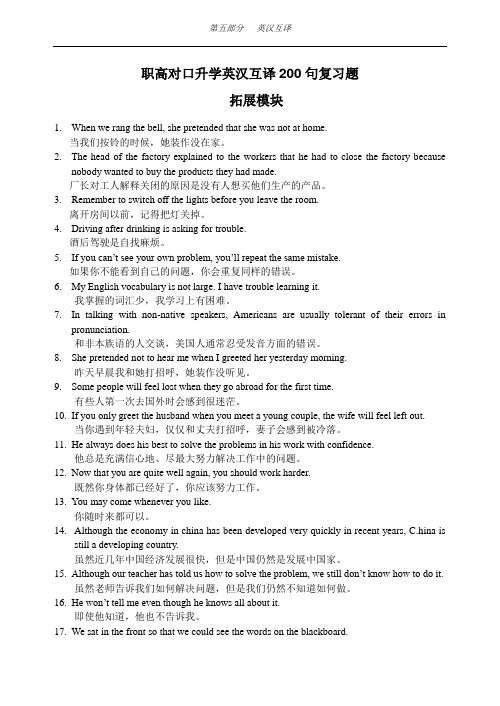
职高对口升学英汉互译200句复习题拓展模块1.When we rang the bell, she pretended that she was not at home.当我们按铃的时候,她装作没在家。
2.The head of the factory explained to the workers that he had to close the factory becausenobody wanted to buy the products they had made.厂长对工人解释关闭的原因是没有人想买他们生产的产品。
3.Remember to switch off the lights before you leave the room.离开房间以前,记得把灯关掉。
4.Driving after drinking is asking for trouble.酒后驾驶是自找麻烦。
5.If you can’t see your own problem, you’ll repeat the same mistake.如果你不能看到自己的问题,你会重复同样的错误。
6.My English vocabulary is not large. I have trouble learning it.我掌握的词汇少,我学习上有困难。
7.In talking with non-native speakers, Americans are usually tolerant of their errors inpronunciation.和非本族语的人交谈,美国人通常忍受发音方面的错误。
8.She pretended not to hear me when I greeted her yesterday morning.昨天早晨我和她打招呼,她装作没听见。
9.Some people will feel lost when they go abroad for the first time.有些人第一次去国外时会感到很迷茫。
中职英语(高教社2021)拓展模块Unit3Doing Our Part for

Unit 3 Doing Our Part for the Environment第一、第二课时Listening and Speaking一、教学内容分析本课教学内容选自《英语拓展模块》第三单元“Doing Our Part for the Environment”听说板块(Listening and Speaking)。
本板块内容以环境保护为主题,共有四个短对话和两个长对话听力活动以及两个口头交际活动。
四个短对话分别从空气质量、塑料袋使用、植树、绿色出行等方面呈现了交际内容,目的是激活学生相关的语言知识和生活常识,同时让学生了解环境保护涉及生活的方方面面。
两个长对话的主题分别针对雾霾问题及环境保护举措,旨在训练学生通过听对话获取有关环境问题的信息及理解具体环保措施的能力,也为学生了解环保活动中个人行为的重要性提供了内容载体。
该板块教学内容要求在讨论环境问题与环境保护的语境中,学生能够听懂讨论环境问题和应对措施的对话,根据对话内容概况主人公的环保态度;熟悉描述环境问题的表达,口头简要介绍应对环境问题的措施和垃圾分类的知识;能够与同伴就日常生活中的环保举措进行讨论,体现“从我做起”的环保观念。
二、学情分析环境保护是与学生日常生活紧密相关的话题。
学生基本都有垃圾分类、绿色出行等与环境保护相关的生活经验,因而学生有进行本话题讨论的基础和素材。
同时,学生在基础模块中学习过绿色地球的话题,在了解有关环境问题的信息时,对于环境问题和垃圾分类等信息要素可进行迁移应用,如protect、recycle 等词汇以及“Paper, cans and bottles can be recycled.”和“We can help reduce waste and protect the environment.”等句型。
但学生对于应对环境问题的措施等内容较少进行深入交流,用英文描述更多环保举措还存在表达困难。
同时,学生存在话题词汇量少,自主获取知识和系统总结所学内容的意识较差,课堂上有表达的诉求,但往往受英语知识储备量所限,表达的意愿较弱,英语综合应用能力较弱,因而教师在课堂上通过模拟访谈的方式,由易及难,不断增强学生表达的自信心,提高表达能力。
中职英语拓展模块练习册Unit 3完形及译文
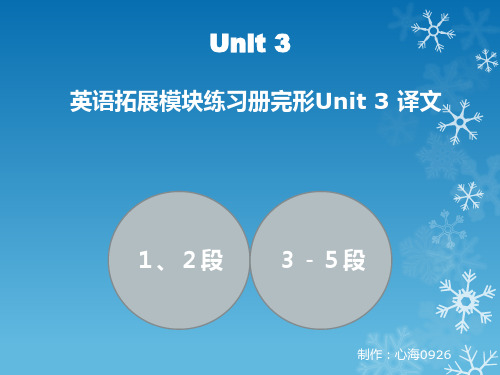
戴维斯很穷,没有钱去申请一项专利,提出与斯特劳斯 合伙,如果他愿意支付费用。
返回首页
Levi’s, the blue jeans invented by Levi Strauss in 1873, has become one of the world’s most popular clothing items. In 1853 Strauss sailed to San Francisco to join in a dry-goods business. In 1872 he received a letter from Jacob Davis, a tailor who was one of his regular customer. In his letter, Davis told Strauss about his invention of riveting the pocket corners of work pants to make them stronger. Davis was poor and had no money to file a patent on his invention and offered to go into partnership with Strauss if he would pay the fees. It benefited both of them. So in 1873 the blue jeans were born.
返回首页
Levi’s, the blue jeans invented by Levi Strauss in 1873, has become one of the world’s most popular clothing items. In 1853 Strauss sailed to San Francisco to join in a dry-goods business. In 1872 he received a letter from Jacob Davis, a tailor who was one of his regular customer. In his letter, Davis told Strauss about his invention of riveting the pocket corners of work pants to make them stronger. Davis was poor and had no money to file a patent on his invention and offered to go into partnership with Strauss if he would pay the fees. It benefited both of them. So in 1873 the blue jeans were born.
- 1、下载文档前请自行甄别文档内容的完整性,平台不提供额外的编辑、内容补充、找答案等附加服务。
- 2、"仅部分预览"的文档,不可在线预览部分如存在完整性等问题,可反馈申请退款(可完整预览的文档不适用该条件!)。
- 3、如文档侵犯您的权益,请联系客服反馈,我们会尽快为您处理(人工客服工作时间:9:00-18:30)。
Unit 1 语言交际中的礼仪美国人对理解英语有困难的非本国人一般比较宽容。
但是如果有人假装听懂了而实际上并没有听懂,并且由于误解对方的话而引起了问题时,他们就会烦恼。
当我们想要soup (汤)时,谁也不想得到soap(肥皂)。
所以如果你不明白别人对你讲的话时,就要承认并且有礼貌地请这人重说一遍或解释一下。
第二,只顾用你的本国语同人讲话而让你没过朋友在一边站着,这种做法是非常无礼的。
这些美国人一定会不知所措,因为他们听懂不懂你们的谈话,他们也可能会觉得你们是在谈论他们或者你们在说一些不想让他们听见的事情。
如果你必须向你不讲英语的同伴转成用母语解释什么时,至少要告诉你的美国朋友一下,那么他们就不会觉得受到冷落了。
第三,只要再学习那么几句英语的礼貌用语,你就会把我地面对美国人了。
别人夸你的外貌或工作时,有礼貌的回答是:“Tank you(谢谢你)。
”仅仅微笑和点头是不够的,对“Tank you”的回答然是“You’re welcome”或“It’s OK(别客气)。
”如果有人问你“How are you (你好吗)?”不必告诉他你的医疗历史,只要说“Fine,thanks(很好。
谢谢。
),and you(你好吗)?”就够了。
最后,如果有人打喷嚏,你应当怎么说?听起来似乎不合适,但正确的回答是“上帝保佑你”。
还要记住你在和别人谈话中华在听众面前咳嗽时,你都必须先说,“Excuse me(对不起)”。
既然你已经对没过的礼貌有了简单的了解,那么你就完全可以有礼貌地运用英语了。
希你的美国朋友也是一样礼貌。
Unit 1 非言语交际我们互相之间用语言进行交流。
但如果我们彼此不懂得对方的语言,我们还能交流吗?答案是肯定的。
我们可以借助收拾、眼神和面部表情进行交谈。
当我们通过收拾和面部表情进行交流时,我们进行的就是非言语的交际。
这是不用语言来表达我们的意图或感受的一种方式。
比如,微笑和握手表示欢迎。
潮人摆手表示“你好”或“再见”的意思。
当我们赞同别人时,我们用点头来表示,而摇头意思是“不赞同”。
在我们难以做出决定时,我们皱眉。
讲汉语和讲英语的人赋予这些手势同样的意义。
然而,来自不同文化的人们在理解相互间非言语交流的方式时会感到困难。
就拿点头来作为例子。
在一些亚洲国家,点头表示的是“否点”而不是“肯定”的意思。
再举一个例子。
美国人用两个手指围城一个圈来表示好几种意思:“OK(好的,行)”,或者“很好”。
但这个用来表示“OK”的收拾在日本是钱的标志。
同样这个收拾在一些拉丁美洲国家被认为“格调很低”。
这就是为什么一家拉丁美的报纸喜欢刊登尼克松总统用两只手来表达“OK”的照片。
这样我们就爱明白了不同文化的非言语交际的方式不是一致的。
然而就像没有声语言一样,非言语交易也表达一定的意义。
虽然没有声音,有时它表达的要比语言还清楚。
当我们使用一种外语时,了解一些首饰或身体动作在外国文化中的意义是很重要的。
恰当地使用提示语将有助于我们同别人交流,实际我们在国外生活得更为轻松,更为舒适。
Unit2 生活就是这样迈克是那种让你又疼又爱的家伙。
他总是心情很好,总是讲让人振奋的话。
如果有人问他进来怎么样时,他总会回答“再好不过了!”他真正是一个精力充沛、无忧无虑的年轻人。
迈克常说:“每天早晨我醒来就对自己说,‘迈克,你今天又两种选额,你可以选择一个好心情,也可以选择一个坏心情。
’我选择了好心情。
每当有事情阿生的时候,我可以选择一个受害者,也可以选择从中汲取好的经验。
我选择向生活学习。
”我努力去理解他说的这番话,生活实际上就是选择。
每种情况都是一种选择。
你可以选择乐观的态度,也可以选择悲观的态度。
说到底你是在生活,是你使生活幸福或沮丧。
后来,我离开了我们在一起工作过的那家大公司。
不过当我做出一个选择时,我常想起迈克。
我学会了在有选择时采取积极的态度,而不会失去希望,不会沮丧。
几年后,我出了一场车祸,双腿受了重伤。
我躺在地上时,记起了我有两种选择:我可以选择活下去,也可以选择死。
我选择了活下去。
我或了下来,而且生意做得很成功,这多亏了一声的治疗,也归功于迈克对待生活非凡的态度。
人们常说:“选你所爱,爱你所选。
”为什么我们不选自己所爱,并且快乐地生活着呢!Unit2 正正当当三美元那是1867年.马克·吐温没有钱花了.他在街上游荡,想找个办法赚些钱。
最后,他进了一家旅馆,在大厅里坐了下来。
一只可爱的狗过来了。
马克·吐温把它放在了自己大腿上这时一位陆军将军走过来,他被这只狗吸引住了。
他对马克·吐温说:“这只狗棒极了,你愿意卖掉吗?”想着自己空空的肚子,马克·吐温觉得这似乎是一件极好的事情,就说道:“行”将军问:“你要多少钱”?“三美元”将军大吃一惊,说“只要三美元!真的吗?”“就是三美元。
”“那好,既然你坚持要三美元,”将军说。
他把钱给了马克1吐温,带着狗上楼去了。
大约十分钟之后,一位中年绅士过来了,开始四处查看。
马克·吐温问他是否在找一只狗、这个男人本来看上去很悲伤,很苦恼,但现在他脸上露出了喜悦的神情,他回答说:“是的。
你见到了吗?”“见到了。
一分钟之前它还在这儿,接着我就看见它跟以为绅士上楼去了。
我想我能帮你把它找回来,如果你愿意让我试试的话。
”这位绅士请求马克·吐温试试,并答应为这个麻烦付他报酬。
他问马克·吐温想要多少钱。
“三美元。
”“噢,没什么。
我愿意多付一些。
”“不,(价钱)就是三美元。
”马克·吐温想旅馆接待员要来了那位将军的房间号。
门开了,马克·吐温请求将军归还那只狗。
“为什么?”将军问。
“狗的主人想把它要回去。
”“你不是狗的主人吗?”“不,我不是。
”将军大声嚷起来了,可是他没力气跟马克·吐温去争论。
最后,马克·吐温把三美元退还给将军,把狗带下楼去。
他把狗归还了狗的主人,收下了干这工作的(或完成这项任务的)三美元。
Unit 3 蓝牛仔裤的诞生每当你穿上旧式牛仔裤时,你在穿上一段历史。
这种紧受各国人喜爱的裤子到今天已经有了一百五十多年的历史。
第一批牛仔裤是于1850年在加利福尼亚淘金潮中制作的。
一个名叫李·施特劳斯的人意识到金矿里的矿工平常穿的裤子太快就破了。
他买了一些结实的帆布,本想用来做帐篷和车篷,然而他却用它们做成了一些裤子,这就是世界上第一批牛仔裤——当时是棕色的。
这些牛仔裤卖得很好,施特劳斯开始四处想办法把裤子制作得更结实些。
他找到了一种比帆布更好的布料——一种仅在法国南部生产的棉布。
施特劳斯订购了好几船这种布料,为了颜色一致,就把它们染成了深蓝色。
后来这种牛仔裤就被称为“蓝牛仔裤”。
开始的时候,牛仔、农民和矿工——所有在户外干活的人都穿牛仔裤。
但是早期牛仔裤的款式设计上有些问题。
当牛仔们蹲下来太靠近篝火的时候,裤裆处加固用的铆钉就太烫了,让他们感到很不舒服。
施特劳斯对此没怎么在意,直到20世纪40年代一位公司的经理人员亲自体验到了这一问题。
不久牛仔裤的裤裆处就不再用铆钉了。
十九世纪五、六十年代,牛仔裤变得流行起来。
影星像约翰·威恩和玛丽莲·梦露穿上了牛仔裤,还有流行歌手像液石乐队的成员们也穿。
到七十年代时尚有了变化,牛仔裤变得非常非常紧身。
如果站着时你能把拉链拉上来,那裤子还不够紧身。
你必须躺在床上才能把裤子拉链拉上才够紧。
这样,矿工们的老式工作裤式样变化越来越多;牛仔裤诞生150多年后的今天,各种款式和各种颜色的牛仔裤仍然非常流行。
Unit3美国的饮食方式一般说来,美国食品的味道比较清淡。
色拉很受欢迎,常年供应。
许多美国人都想减肥。
这在提供“低卡路里”套餐和“控制体重”套餐的菜单上有所体现。
市场里,可以看见无热量饮料(即不含卡路里),比如可乐饮料。
饰品店里也可以买到不含糖或盐分的“减肥”食品。
许多美国人进餐时都喝咖啡或茶。
如果美国餐馆里的服务员问你:“现在,还是等一会儿?”他的意思是“您是想吃饭时喝咖啡还是等饭后再喝?”在美国,当我们在外面吃饭时,如果我们不喜欢咖啡,可以要求喝茶、牛奶、啤酒,等等。
美国饭店除非经过许可,否则是不能售卖啤酒、葡萄酒或烈性酒的。
美国的主菜通常是肉、鸡或者鱼,但一般情况用餐只有其中的一样。
白天大多数美国人吃饭快——也就是吃早餐或午餐——除非是社交、上午或家庭聚会这些场合。
然而晚餐通常是全家人坐下来一块想用。
白天吃饭快是美国生活节奏的组成部分,因为工作时间被认为是宝贵的。
遍及全国的快餐连锁店符合美国人的饮食方式。
这些连锁店的产品价格合理,服务快捷,而且不管是在纽约城或在洛杉矶,买到的同类食品味道一模一样。
麦当劳是其中最大的快餐连锁店。
麦当劳里供应有各种供挑选的汉堡、炸薯条和可口可乐。
这些食物脂肪、糖和盐的含量高。
许多年轻的上班族常常把这些食品作为自己的主食。
总之,食品在美国文化中扮演者重要角色,因为它与人们的生活和健康密切相关。
Unit4 颜色的联想联想就是在大脑中把两件事或两个想法联系起来。
比如:由绿色联想起圣诞节。
心的形状用来表示爱。
着色经常和不同的物体、感受以及节日联系在一起。
下面就给你举些例子。
红色用来表达一种强烈的感受,像生气。
当有人非常生气时,人们会称他/好sees red( 火冒三丈)。
红色也带有好的意义,假日被称为 a red-letter day(标有红字的日子)。
贵宾一般受到隆重的接待(a red-carpet treatment,地上铺了红地毯)。
但当有人在偷东西时被抓住,人们说“he was caught red-handed”(被当亏场捉住)。
黄色在美国有特殊的意义,当家庭成员盼着他们的亲人回到家中时,他们把一条黄色的丝带钉在门上或是系在树上,在路上,黄色用来提醒人们要小心。
街上的交警穿上黄色的马甲向过往司机提醒他们的存在。
另外,路中间的一道黄线提醒司机不要开到到对面的车道去。
蓝色是天空和冰的颜色,所以它是一种冷色。
如果有人很悲伤,他会说,“I’m feeling blue(我很伤心)”如果有人被打得遍体鳞伤,人们会说这个人is beaten black and blue(被打得青一块紫一块)。
很有趣的是,“蓝色”这个诩还跟股市联系在一起。
股市中有前途并安全的股票叫蓝筹股。
通过联想我们能够记起过去并发生的事情。
当然,生活给我们留下了愉快的回忆,也有不愉快的回忆。
交通罚单可以让司机想起他闯红灯被罚款的事。
而大多数人愿意在一个漫长的冬天过后看见四野变为绿色,因为它宣告了春天的到来。
颜色与情绪“情绪”词是指我们在某一特定时候的感觉。
比如:当我们情绪不高兴时,我们说心情不好。
如果我们取得了成绩,比方说,得了一个高分或是成功地完成了一项任务,我们说心情很好。
然而,我们的情绪并非完全在我们的控制之下。
